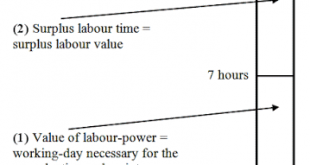A priceless moment in a Sanders versus Clinton debate last year![embedded content]In reality of course, Bernie is just an honest New Dealer who wants a Western European social democracy.And as for the top US federal marginal tax rates under Eisenhower, we can see them in the graph below. This graph shows the top US federal marginal tax rates on (1) earned income (in red) and (2) (where it diverges from the latter) ordinary income (in blue), from the the data here. And yet even with rates...
Read More »Paul Bairoch on the Industrial Revolution, Imperialism and Capitalism
The economic historian Paul Bairoch (1930–1999) subjected some Marxist myths about Western capitalism and imperialism to critical scrutiny in his now classic book Economics and World History: Myths and Paradoxes (New York and London, 1993).First, was the Western industrial revolution dependent on energy from the Third World?Bairoch (1993: 59) notes that right up until the post-WWII era the West was almost completely self-sufficient in energy, and as late as the 1930s much of the developed...
Read More »Bernie Sanders versus Stephen Colbert
Good fun.[embedded content]
Read More »American Socialism and Mass Immigration
It’s surprising how many people have forgotten what the radical American left used to believe about this issue.At a famous Socialist Congress that occurred in Chicago in 1910, American socialists adopted the following resolution: “The Socialist party of the United States favors all legislative measures tending to prevent the immigration of strike breakers and contract laborers, and the mass importation of workers from foreign countries, brought about by the employing classes for the purpose...
Read More »The Future before your Eyes
What happens as the few workers we see in these videos below are no longer needed? And, even more importantly, when middle class and professional jobs get hit by the same trend through AI and more sophisticated software?Capitalism has both a supply-side and demand-side. As more and more work is done by machines or software, the relationship between aggregate demand growth and private sector employment growth will start to break down – or at the very least become very weak. Eventually, a...
Read More »Marx rejected Fiat Money
This can be clearly seen from Marx’s statement in Chapter 3 of volume 1 of Capital: “The State puts in circulation bits of paper on which their various denominations, say £1, £5, &c, are printed. In so far as they actually take the place of gold to the same amount, their movement is subject to the laws that regulate the currency of money itself. A law peculiar to the circulation of paper money can spring up only from the proportion in which that paper money represents gold. Such a law...
Read More »The British European Union Referendum
What will its result be? And if the UK leaves how will this affect the ongoing EU crisis?In the interview below, we have one of those odd moments when the radical left and populist right agree: the EU corporate tyranny is a threat to UK democracy.[embedded content]
Read More »Communist Imperialism
One of the most absurd aspects of the Marxist and communist mentality is the militant unwillingness to recognise that the Soviet Union practised its own form of imperialism, and that there is no special reason to imagine that powerful communist states – if they existed – would avoid imperialist behaviour, given that, no matter whether a state is communist or capitalist, it will almost inevitably be drawn onto the world stage to protect its interests and access to resources and...
Read More »The Long-Run Tendency of Capitalism is to Decrease the Rate of Exploitation
This follows quite clearly from (1) the logic of Marx’s own theory in volume 1 of Capital and (2) the empirical history of capitalism.Let us run through the steps: (1) Let us assume that the concept of abstract socially necessary labour time is valid (even though the concept is incoherent, cannot be properly defined and is empirically irrelevant). But, as I note, let’s assume – for the sake of argument – that it is coherent and empirically relevant.(2) For Marx, the total working day is...
Read More »Debunking Marx’s Concept of Exploitation based on Surplus Labour Value
The working day under Marx’s theory in volume 1 of Capital can be conceptualised in the diagram below, where there is a total working day of 12 hours. Although the total working day in any particular industry can be variable, there are two parts of the working day as follows: (1) necessary labour-time, which is “determined by the working time required for the reproduction of the labour-power of the labourer himself” (Marx 1906: 256), and(2) the surplus labour-time (Marx 1990: 341). Let us...
Read More » Socialdem. 21st Century
Socialdem. 21st Century


